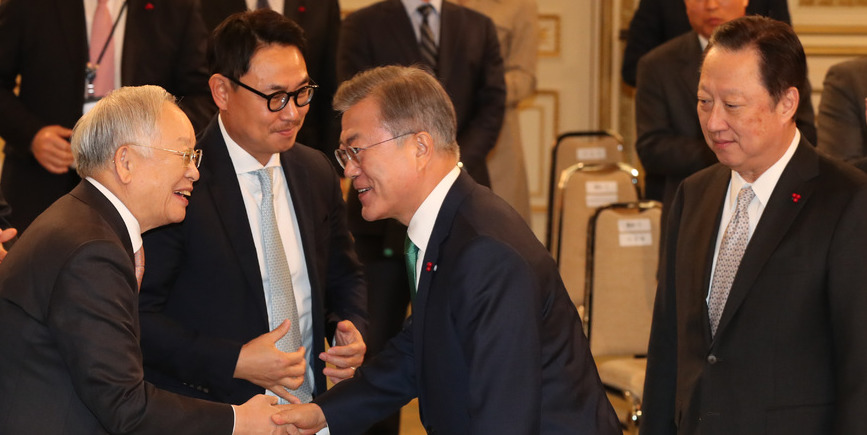 |
|
South Korean President Moon Jae-in greets CJ Group Chairman Sohn Kyung-shik in a meeting with corporate executives and business leaders at the Blue House on Jan. 15. (Kim Jung-hyo, staff photographer)
|
President’s goes all-in on campaign to boost economic vitality
SK announced plans on Feb. 21 to invest 120 trillion won (US$106.86 billion) in semiconductors. The project involves building four factories in the “semiconductor cluster” in Yongin, Gyeonggi Province, starting in 2022. After previously being blocked from a factory site by regulations for the greater Seoul area, the company found its path cleared when the Moon administration granted permission. The development could be seen as result of South Korean President Moon Jae-in’s efforts to go “all in” on the economy, which began in earnest early this year. For over 50 days, Moon has been paying in-person visits to businesses and meeting with officials from large corporations, SMEs and venture enterprises to ask for increased investment and hiring and to underscore the administration’s commitment to promoting economic vitality. He has also met and communicated with small-scale merchants and self-employed small business owners as part of an all-out campaign to bolster “economic livelihood.” A Blue House official summarized the two economic teams connected to Moon’s economic push (under Deputy Prime Minister for the Economy Hong Nam-ki and Chief Staff for Economic Policy Kim Soo-hyun) as performing a “crisis management” role. Their aim is to reverse the slide in the president’s approval ratings while achieving visible results in economic livelihood, which has been cited as the single biggest factor in their decline. The general election next year is also seen as representing a tall order under the current circumstances. The key means of managing the crisis lie in encouraging large corporations to invest and hire more and expanding social overhead capital. To achieve that, the administration has opted to risk controversy by opting for an all-out push involving major deregulation measures, meetings with Samsung Electronics Vice Chairman Lee Jae-yong (who is currently facing trial on bribery charges), and waiting pre-feasibility studies on SOC investment. The response from the business community has been positive. An executive with one of the top ten ranked chaebol groups noted, “The president has faced a lot of complaints to date about not focusing enough on the economy and failing to communicate with businesses.” The changing mood has led in turn to some of the groups announcing new investment, as the SK case exemplifies. Hyundai Motor has similarly inked plans to invest in “Gwangju-style jobs”; some have speculated Samsung could take part as well. This has been taken as suggesting a token of “good faith” will be offered ahead of the Supreme Court decision in Lee’s case. An agreement was also reached among labor, management and the administration on Feb. 19 to expand unit times for the flexible working hour system to supplement the 52-hour working week cap. “As the first major social compromise reached since the Economic, Social and Labor Council (ESLC) was launched, this is like getting rain in the middle of a drought,” said ESLC standing committee member Park Tae-ju. Poor economic performance behind unstable approval ratings Previously in danger of dipping below the 40% mark, support ratings for Moon began to rebound in mid-January. They have since hovered around 50%, buoyed by anticipation for the upcoming second North Korea-US summit. But in the key area of economic livelihood, results have yet to emerge. If anything, the economic indicators all point in a negative direction, with a widening income gap and sharp rises in the unemployment rate and number of unemployed persons. “The actual execution of the investment plans announced by companies and the government is still a few years down the road, and with the global economy sinking as a whole, it was always going to be unlikely that the president’s economic push would yield results straight away,” said a Korea Development Institute (KDI) researcher speaking on condition of anonymity. “The investment plans are meant as a political message,” the researcher said. Moon’s support ratings stand to take a hit once again if the popular economy fails to improve. Conservatives have unanimously called on the administration to abandon its income-driven growth policies outright, decrying them as a “disaster of distribution and employment.” Progressives are also wary of the president’s economic push. “He may not have thrown reforms into the garbage can, but he does seem to have filed them away in a drawer,” said one progressive figure. Policy transformations for economy have mostly failed with past administrations Few if any past administrations have succeeded with their “policy transformations.” The Park Geun-hye administration pledged economic democratization, but shifted course toward “saving the economy” after less than half a year in office. The Lee Myung-bak administration billed itself as “corporation-friendly” before presenting “shared growth countermeasures” in its second year. Neither is seen as having been a success. Leaving aside the question of whether new policies represent the right direction, they leave an administration vulnerable to growing uncertainties stemming from the loss of policy consistency, draining the momentum behind the push. Given Moon’s general emphasis on principles, he appears unlikely to declare a complete abandonment of reforms. Former Blue House Senior Secretary to the President for Economic Affairs Hong Jang-pyo said Moon “wants to carry out reforms while also increasing economic vitality.” But if the emphasis going ahead falls on crisis management, reforms could be shifted farther down the priority list – leaving the Moon administration facing a greater risk of repeating the experience of its predecessors. Now that Moon is going all in on the economy, what will actually come of this push? By Kwack Jung-soo, business correspondent Please direct comments or questions to [english@hani.co.kr]






